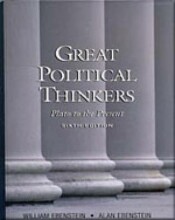Summary: Great Political Thinkers : Plato To The Present | 9780155078895 | William Ebenstein, et al
- This + 400k other summaries
- A unique study and practice tool
- Never study anything twice again
- Get the grades you hope for
- 100% sure, 100% understanding
Read the summary and the most important questions on Great political thinkers : Plato to the present | 9780155078895 | William Ebenstein, Alan Ebenstein.
-
4 Aristotle
This is a preview. There are 15 more flashcards available for chapter 4
Show more cards here -
Perversions of 3 types of true government?
1. kingship - plutocracy2. aristocracy - oligarchy3. constitutional government - democracy (rule of the poor) -
What is the aim/function of the village?
"aimed at something more that the supply of everyday needs"- primitive cultural wants that the family cannot satisfy. -
List the hierarchy of communities.
1. family2. village3. city-state -
Organic conception of the state vs. the instrumentalist conception of the state
Aristotle was the first to clearly define the state as a community and he laid the foundation for the organic conception of the state.ORGANIC CONCEPTION OF THE STATE: the state is a natural community, an organism with all the attributes of a living being.instrumentalist: (older than organic conception). - state is an instrument, a mechanism, piece of machinery used for needs & ends higher than itself. -
What is the aim/function of the city-state?
"The state exists for the sake of the good-life and not for the sake of life only". "Political society exists for the sake of noble actions and not for the sake of mere companionship. -
Aristotle opens Politics with two major ideas...
1. That the state is a community2. That the state is the highest of all communities -
Man represents a compound of qualities, what are they?
Material appetites & biological urgesSocial sentimentMoral nature -
Democrats do not agree with the organic conception of the state for two reasons:
1. No institution is entitled to claim primary & excessive loyalty.2. Man can feel attached to various, often conflicting groups. -
4.2.1 A on constitutional government (polity)
This is a preview. There are 7 more flashcards available for chapter 4.2.1
Show more cards here -
What will happen to a state where many poor men are excluded from office, according to A?
... "it will necessarily be full of enemies" -
4.3 A on constitutional government (polity)
This is a preview. There are 2 more flashcards available for chapter 4.3
Show more cards here -
Aristotle defines a citizen as:
A. defines a citizen as: "he who has the power to take part in the deliberative or judicial administration of any state".
- Higher grades + faster learning
- Never study anything twice
- 100% sure, 100% understanding
































